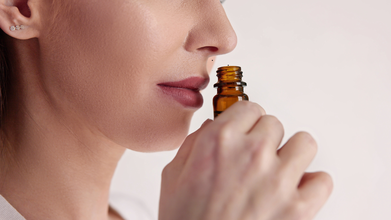- Health Conditions A-Z
- Health & Wellness
- Nutrition
- Fitness
- Health News
- Ayurveda
- Videos
- Medicine A-Z
- Parenting
- Web Stories
If Sex Leaves You 'Burning or Itchy' You Might Have A Semen Allergy—How To Tell If You’re Allergic?

Credits: Canva/Freepik
Sex is typically all about pleasure, intimacy, and—yes—a healthy dose of natural feel-good hormones but for some, sex can also have an added, decidedly uncomfortable surprise: an allergic reaction to semen. Though it sounds unusual and even bizarre to many, semen allergy, or medically termed seminal plasma hypersensitivity (SPH), is a legitimate and underdiagnosed condition—and notably, it doesn't only occur in women, men can also experience it.
SPH is a type I hypersensitivity reaction—much like the way some individuals react to peanuts, pollen, or dander from a cat. First described in the late 1960s, SPH is not caused by the sperm cells themselves, but by proteins of the seminal plasma, the fluid that coats sperm. One main perpetrator seems to be prostate-specific antigen (PSA), a protein found in common semen.
What is Semen Allergy?
A semen allergy is a reaction by the immune system to proteins within seminal plasma, the liquid that transports sperm, rather than sperm cells. It was first described in the 1960s and is now considered a type 1 hypersensitivity, which includes such allergies as peanuts, pollen, and animal dander.
The reaction may lead to burning, itching, redness, or swelling wherever semen touches the skin or mucous membranes. In more severe reactions, it may initiate systemic symptoms like hives, wheezing, dizziness, or even life-threatening anaphylaxis.
Is Semen Allergy Really That Common?
SPH was previously thought to be very rare, with fewer than 100 cases reported around the globe in the late 1990s. More recent findings contradict this. A late 1990s study discovered that almost 12% of women with postcoital symptoms could be diagnosed with probable SPH. Figures now estimate that as many as 40,000 American women may be suffering from the condition. The experts warn that their estimates are probably on the low side, however, because so many individuals are unwilling to complain about sex-related symptoms or misdiagnosed with yeast infections or other problems.
Men, in fact, can be allergic to their own semen—a condition referred to as post-orgasmic illness syndrome (POIS). POIS is a rare condition that results in flu-like symptoms like fatigue, brain fog, and muscle pain just after ejaculation.
Women with the condition can experience symptoms within minutes after exposure to semen—usually during or after unprotected anal or vaginal sex. They can experience anything from irritation (burning, redness, vulvar or vaginal lining swelling) to systemic allergic reactions like hives, facial swelling, wheezing, diarrhea or even anaphylaxis. Although there have been no reported deaths from semen allergy the physical and emotional cost it can exact is immense.
What Triggers a Semen Allergy?
At the core of the disorder lies the immune system confusing proteins contained in seminal fluid as dangerous invaders. This may activate the release of histamines and other inflammatory chemicals that trigger itching, pain or worse.
One can be allergic to the semen of one partner but not the other because of individual protein combinations and possible residues of drugs, foods, or allergens such as Brazil nuts in semen. There can be cross-reactivity in extremely rare instances when a person with a dog allergy, for instance, can be allergic to semen because the canine and human PSA proteins have similarities. Other aspects that can affect:
Genetic susceptibility: Individuals with a history of allergy or atopic disease in the family are potentially predisposed to SPH.
Cross-reactivity: Certain proteins within semen bear resemblance to allergens on pet dander or even food proteins, causing an unanticipated reaction. A woman with a hypersensitivity to dogs, for instance, can produce an allergic reaction to semen because proteins in semen share structural features.
Medications and diet: Residuals of drugs or food allergens may be found in semen, resulting in reactions in reactive partners.
Hormonal changes: Menstrual cycle fluctuations or pregnancy can affect immune system reactions and symptom intensity.
If you regularly have burning, itching, or swelling in the genitalia following unprotected intercourse—and the symptoms resolve when a condom is worn—you might be facing SPH. Systemic signs such as hives, wheezing, or lightheadedness within minutes of ejaculation are stronger predictors.
Keep in mind that a number of other conditions are similar in symptoms—yeast infection, UTI, or latex allergy among them. That's why expert diagnosis is necessary. Allergy testing on your partner's semen (or using PSA-specific antibodies) can shed some light.
Wait, Men Can Be Allergic to Their Own Semen?
Yes, it is possible. In a very rare condition known as Post-Orgasmic Illness Syndrome (POIS), men develop flu-like symptoms—muscle pain, tiredness, mental confusion—just after ejaculation. Although the reason is not clear, POIS is believed to be an allergic or autoimmune response to one's own semen.
In others, men experience rashes or irritation of the skin on the shaft or foreskin of the penis—particularly if semen comes into contact with the skin during sex or masturbation. In some instances, skin-prick testing using the man's own semen can diagnose this condition.
Impact on Fertility and Relationships
SPH does not cause infertility, but it can complicate conception. Since avoiding semen is the most effective way to prevent symptoms, couples trying to conceive face unique challenges. Treatments include:
- Antihistamines taken before sex to reduce or prevent symptoms.
- Desensitization therapy, where diluted seminal plasma is introduced gradually to build tolerance.
- IVF with washed sperm, which removes the allergenic proteins, allowing for conception without triggering a reaction.
- A lot of women with SPH have successfully gotten pregnant, naturally or with medical interventions
Can You Prevent or Treat Semen Allergy?
The most simple and effective way to avoid symptoms is to employ the use of condoms, which can suitably avoid contact with semen and nullify allergic reactions altogether. Nonetheless, when condoms are unavailable or in cases of severe symptoms, antihistamines, EpiPens, and desensitization procedures might come into play.
It's important to see a board-certified allergist, preferably with experience in treating unusual sexual allergies. In a few instances, referrals to academic medical centers are necessary because of the esoteric nature of this condition.
Why People Don't Know About Semen Allery?
Even in 2025, sexual health still carries a significant stigma. Many people, especially women, feel uncomfortable discussing pain or irritation following sex. This silence can lead to misdiagnosis, with symptoms often attributed to yeast infections, bacterial vaginosis, or STIs.
In Bernstein's 1997 research, almost half of the symptomatic women had never been tested for SPH. Consequently, many of them wasted decades suffering in silence, receiving ineffectual treatment and even relational strain.
In spite of its prevalence, semen allergy continues to be underdiagnosed and subject to misconceptions. Stigma, shame, and lack of familiarity among medical providers translate into many individuals suffering silently. Research indicates that almost half of women with post-coital symptoms have never been examined for SPH.
A stinging, burning feeling after sex is never normal—and not something you need to be ashamed of. If you think that you might be allergic to semen, don't stay silent. Speak with your doctor, push for proper testing, and discuss your options.
Your Sense Of Smell Could Decide How Long You Live, According To Doctor

Credits: Canva
Smell is a sense that helps us navigate, feel, and in fact remember things. Thanks or not, but Covid-19 also helped us know its importance, when many people lost the sense of their smell, as one of the major COVID-19 symptom. But, that is not just it, in a podcast posted on Instagram Dr Sanjay Bhojraj, board-certified interventional cardiologist talked to Dr Michael Leon, PhD Professor Emeritus of Neurobiology and Behavior at the Charlie Dunlop School of Biological Sciences on surprising link between smell and overall well-being.
Can Smell Predict How Long Will You Live?
“By the time you reach middle age, your sense of smell can actually predict all-cause mortality,” says Dr Leon. “That means whether you live or die, for any reason, can be accurately reflected in your ability to detect odors.”
The expert says that out olfactory system bears a direct impact to the brain's memory and emotional centers. “It has a great deal of impact when you lose it. And also when you amplify it. When you smell a pleasant odor, it activates the cerebellum and increases sniffing. For example, when you smell a rose, you naturally take a deep sniff.”
How Does Smell Impact Your Brain?
When you encounter a bad or disgusting odor, your body reflexively stops respiration. You instinctively avoid breathing it in,” Dr Leon says.
The expert said it is these subtle responses that influence one's memories, emotions, and overall brain function. “The olfactory system is just much more powerful than most people realize,” he says.
Can Body Odor Also Reveal Things About Your Health?
This link between smell and health became famous when Joy Milne, a retired Scottish nurse, claimed she could detect Parkinson’s disease by scent alone. Years before her husband’s diagnosis, she noticed a distinct musky odor on him. When she later met others with Parkinson’s, they all carried the same smell. Curious scientists put her to the test — and she correctly identified patients just by sniffing their shirts, even predicting one man’s diagnosis a year before doctors confirmed it.
Her unique ability led researchers like Professor Perdita Barran at the University of Manchester to discover that people with Parkinson’s excrete specific lipid-like molecules through their skin. These include hippuric acid and octadecanal, which may form the disease’s distinct odor. Barran’s team is now developing a simple skin-swab test that could help doctors detect Parkinson’s much earlier.
Different diseases create different odors. For example, a fruity or “rotten apple” smell can indicate uncontrolled diabetes, caused by a build-up of ketones. A fishy or ammonia-like scent might suggest kidney problems, while a musty smell could point to liver disease. Even infections leave olfactory traces — cholera, tuberculosis, and C. difficile each produce distinct, unpleasant aromas.
Is It Possible To Get The Same Cold Twice?

Credits: Canva
Did you also wake up with a mild cold? A sneeze, blocked nose and a sore throat. It is worse because you had just shaken off the miserable cold and your energy was finally coming back and then now again you are sneezing. So, now the question is, could you really get the same cold twice, or is it just your bad luck?
As per the National Health Service, UK (NHS), adults could get an average of 2 to 4 colds a year. The NHS, UK notes that the viruses behind them behave in a complicated way. This is because some mutate quickly, and some stay in your system. This is why your body's ability to fight them off can differ depending on how well does your immune respond.

Catching The Same Cold, Twice
Conventionally, it is believed that once you have a virus, your body recognizes it and does not let you catch the same virus again. However, this is not the case, always.
Professor Brain Ferguson, who is the professor of viral immunity at the University of Cambridge told Yahoo UK, that it is possible to catch cold twice. This is due to the levels of antibodies that we have in our system.
Ferguson says, "It depends on the quality of the antibodies that your body generates when you get infected the first time. Sometimes your body might make really good ones, and that will stop you being reinfected with the same virus later. But another person might not, and they can catch the same virus, exactly the same one, again later."
The expert further added, "It is also down to the actual molecules, and the constituents of the virus, like proteins and things you make antibodies against. The longer they exist in your body, the better the antibody response tends to be."
This means that the cold can stay in your system, and the longer it stays the better your immune system will be prepared to build up a stronger defense.
Reinfection Time: How Long Does It Take?
If you had two colds very close together, you may not have had enough time to build immune response the first time. Ferguson says, "Reinfection can be very fast."
"It can be as soon as a couple of weeks if the antibody response is very weak... You might pick up a virus and get a few minor symptoms, but fight it off really quickly. In that case, you get much weaker antibodies that fight the virus, which means the same virus appears in your system again very quickly."
This means your body only has a "fleeting encounter" with the virus and thus it won't remember it well enough to protect you the next time. However, a more severe cold may trigger a stronger immune response, which can work as a longer-lasting protection.
Why Some People Catch More Often?
This has something to do with genetics. This is because of their immune system, how good it works against different infections. As Ferguson says, "Some people are just naturally better or worse at fighting off viruses or bacteria due to their genetic makeup."
While it is believed that multivitamins and supplements can help "boost" immunity, Ferguson says that the evidence is mixed.
There’s not a great evidence base for [vitamins] for repeat infections," he says. However, Ferguson adds there is evidence that people who spend more time outside and get more vitamin D tend to have a slightly better-functioning immune system.
Harvard Physician Sue Goldie Finally Reveals After 4 Years About Her Parkinson's Disease

Credits: Harvard TH Chan
"I wouldn't use the word hide," said Dr Sue Goldie to NPR, she is a professor at the Harvard TH Chan School of Public Health, who has finally told the world after four years about her Parkinson's.
She learned about her diagnosis in 2021. She told NPR, "I think I was really trying to give myself room and time to fall apart, to panic, to think about what it meant for me.” For Goldie, silence wasn’t secrecy, it was self-preservation.
She revealed she needed space to understand to first accept that it is happening with her, and secondly to understand how to live with a condition that would alter her movements, her voice, and even her sensing. So she calls the 4-year-gap of not telling anyone as a "process of figuring out how I could be OK."
Parkinson's Disease: How Does It Start?
We often read about Parkinson's disease, what is it, and what it does to someone. However, what we do not talk a lot about is how it starts. We don't talk about the subtle signals one's body sends.
Goldie says it started with a tremor. It was so slight, that it was almost invisible. Then, a running coach mentioned her off cadence. The New York Times (NYT) reports that a trainer noticed her left arm did not lift properly in the pool. Eventually, afterwards, her fingers began twitching. Goldie, then was 50.
She was also at the height of her academic career and was newly obsessed with triathlons. She was in fact, training for Ironman races, reported NYT.
When tests confirmed Parkinson’s, a degenerative neurological disease that affects movement and coordination, her first reaction was disbelief. Then fear. Would her students notice? Would colleagues see her differently?
The diagnosis left her confronting an identity crisis. At what point, she wondered, does a disease become who you are?
Sue With Parkinson's, Who Lived Two Lives
Goldie began to divide her world. At Harvard, she was the confident professor and global health leader, still producing intricate teaching materials and mentoring students. In triathlons, she was freer, surrounded by people who saw her as an athlete, not a patient.
But the effort to maintain that balance came at a cost. As reported by NYT, early mornings were the hardest: walking unsteadily to the bathroom before medication took effect, hiding tremors from colleagues, managing the dopamine pills that controlled her symptoms. “You have no idea how hard it is to trick you into thinking I’m OK,” she later said.
Eventually, she could no longer keep it private. “Starting today, I am Sue with Parkinson’s,” she decided. Most of the people in her professional life would learn about it through her story.
The Camera For Healing
When Goldie's hand tremors made writing impossible, she began to record thousands of video diaries. They were often short, unfiltered glimpses of her daily struggle, which were filmed in her office, car, or home. Sometimes, calm, sometimes in tears.
Her videos began with a "Hello Sue", talking to her future self. In one video as posted by the NYT from 2023, she confessed, “I’m trying hard to do all this stuff that will help, but I’m not feeling OK... I just need to not be alone with it.”
Goldie refused to stop training. Her research had shown that exercise helps manage Parkinson’s symptoms. So, she doubled down, calling herself “an N of 1” — a one-person experiment. She adapted creatively: pink tape on her hands to guide her swim strokes, modified gear on her bike so she wouldn’t lose balance.
In 2022, she completed the Lake Placid Ironman, a 140.6-mile challenge. She crossed the finish line after collapsing, crying, and reapplying lipstick. Her small team called her S.F.G., with the middle initial standing for an unprintable word that captured her spirit.
As her symptoms progressed, Goldie’s fears shifted from physical decline to the erosion of identity. Parkinson’s, she realized, isn’t just about tremors; it’s about dignity, perception, and the quiet grief of being misunderstood.
She worried about whispers at Harvard, about whether others would still see her as capable. When she finally told university leaders, she felt both vulnerable and relieved.
Still, her mission remained unchanged. “I can’t change this,” she told The New York Times in 2024. “So what happens when I get worse?”
She continued teaching, designing, and mentoring. Her hands might tremble, but her mind stayed sharp. “I want to get things done while I’m still the best me,” she said.
© 2024 Bennett, Coleman & Company Limited

